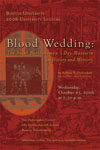2006 University Lecture
Blood Wedding: The Saint Bartholomew’s Day Massacre in History and Memory
 Presented by Barbara Diefendorf, Professor of History
Presented by Barbara Diefendorf, Professor of History
2006 University Lecture
Wednesday, October 25, 2006 at 7:30 pm
Tsai Performance Center
685 Commonwealth Avenue, Boston
英航
 Professor Diefendorf’s first book, Paris City Councillors in the Sixteenth Century: The Politics of Patrimony was published by Princeton in 1983. Realizing that the social history methods employed in this study of an upwardly mobile elite left unanswered important questions about these men’s reactions to the religious quarrels that drove France into civil war by the last third of the sixteenth century, she turned her attention to problems of religious difference and the social and political impact of religious practices and beliefs. These problems are at the heart of her second book, Beneath the Cross: Catholics and Huguenots in Sixteenth-Century Paris. Published simultaneously in hardback and paper by Oxford University Press in 1991, the book won the New England Historical Association and National Huguenot Association Book Prizes and remains in print fifteen years later. Religious practices and the social consequences of belief are also central themes in Professor Diefendorf’s third book, From Penitence to Charity: Pious Women and the Catholic Reformation in Paris, also from Oxford (hard cover 2004; paperback 2006), which won the American Historical Association’s J. Russell Major Prize for the best book in French history in 2005.
Professor Diefendorf’s first book, Paris City Councillors in the Sixteenth Century: The Politics of Patrimony was published by Princeton in 1983. Realizing that the social history methods employed in this study of an upwardly mobile elite left unanswered important questions about these men’s reactions to the religious quarrels that drove France into civil war by the last third of the sixteenth century, she turned her attention to problems of religious difference and the social and political impact of religious practices and beliefs. These problems are at the heart of her second book, Beneath the Cross: Catholics and Huguenots in Sixteenth-Century Paris. Published simultaneously in hardback and paper by Oxford University Press in 1991, the book won the New England Historical Association and National Huguenot Association Book Prizes and remains in print fifteen years later. Religious practices and the social consequences of belief are also central themes in Professor Diefendorf’s third book, From Penitence to Charity: Pious Women and the Catholic Reformation in Paris, also from Oxford (hard cover 2004; paperback 2006), which won the American Historical Association’s J. Russell Major Prize for the best book in French history in 2005.
In addition to her single-authored books, Professor Diefendorf has co-edited a collection of essays,Culture and Identity in Early Modern Europe (1500-1800) (University of Michigan Press, 1993), and published a large number of book chapters and articles in peer-reviewed journals, including theAmerican Historical Review, the Journal of Modern History, French Historical Studies, and the French journal Histoire, économie, et société. Her article “Give Us Back Our Children: Patriarchal Authority and Parental Consent to Religious Vocations in Early Counter-Reformation France” (1996), was runner up for the Chester Penn Higby Prize awarded by the Journal of Modern History for the best article in a two-year period. It also received the Nancy Lyman Roelker Prize (named, coincidentally, for Boston University’s previous early modern French historian) for the best article on sixteenth-century France.
公关
Current projects include a documentary history of the Saint Bartholomew’s Day Massacre for the Bedford Series in History and Culture. This project, which involved research and translation of documents on the causes and events but also the long-term impact of the massacre, provided the inspiration for this lecture. Also in the works is a book that will trace the rise of an intense and activist Catholicism in France from its origins in the sixteenth-century Wars of Religion through the reign of Louis XIV. Tentatively entitled “Devotional Wars in Early Modern France,” it will look at the campaign these radical Catholics, or dévots, waged against religious toleration and the Reformed faith but also at tensions between them and more moderate Catholics and at schisms within the radical fold.
Professor Diefendorf lives in Kittery, Maine, with her husband, Jeffry Diefendorf, a Professor of History at the University of New Hampshire, and kittens Miles and Moses. The latter have not yet shown an interest in history but, like their feline predecessors, enjoy a good nap on a cluttered desk.
